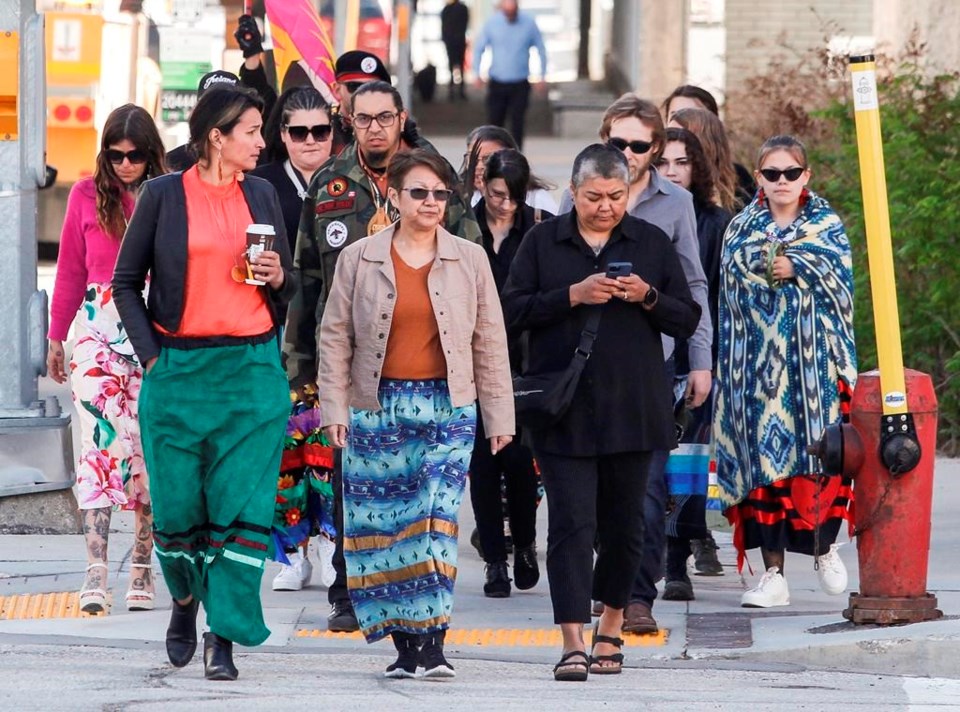WINNIPEG — A former wife of admitted serial killer Jeremy Skibicki testified Thursday about their violent marriage and how it seemed like he had multiple personalities.
The woman said she met Skibicki at Siloam Mission, a Winnipeg homeless shelter, when she was struggling with drug addiction in February 2018.
Skibicki was with two other men, she said, and the group invited her back to Skibicki's home.
"He said he really likes this one ... referring to me," said the 44-year-old Métis woman, who asked not to be named publicly.
Skibicki, 37, has pleaded not guilty to first-degree murder for the 2022 slayings of four Indigenous women: Rebecca Contois, 24; Morgan Harris, 39; Marcedes Myran, 26; and an unidentified woman Indigenous leaders have named Mashkode Bizhiki'ikwe, or Buffalo Woman.
Crown prosecutors have said the killings were racially motivated and Skibicki preyed on the victims at homeless shelters.
Skibicki's lawyers admit he killed the women but argue he's not criminally responsible due to mental illness.
The trial has heard Skibicki assaulted his victims, strangled or drowned them and disposed of their bodies in garbage bins in his neighbourhood. Two women were dismembered.
Prosecutor Chris Vanderhooft said testimony from Skibicki's ex-wife is relevant to the trial because her experiences were strikingly similar to those of the victims.
"We say that in this case, perhaps more than any other domestic situation, the escalated violence and murders require a full contextual explanation," Vanderhooft said.
Wearing a dark shirt and colourful glasses, Skibicki's ex-wife spent roughly two hours detailing their volatile relationship.
After their first encounter, she said, she began staying at Skibicki's home because she was using methamphetamine and had nowhere to go.
The violence started early on, she said.
"He would keep me (in his home) and spit on me and laugh at me," the woman said softly. "I sat there naked for a few days."
One time, she said, Skibicki tried suffocating her with a pillow.
"I said, 'Go ahead, but people know where I am.'"
The abuse eventually turned sexual, she said. She had been prescribed sleeping medication for post-traumatic stress disorder and Skibicki forced her to take the pills each night, she said.
"Jeremy liked when I (took) my meds ... when I would sleep, he would have sex with me."
Vanderhooft asked how the woman knew she was being sexually assaulted. She said she would wake up sore and bleeding.
"He also told me that he was doing it," she added. "His fetish was having me like a rag doll, limp and lifeless sexually."
The two were married in September 2018. Skibicki publicly proposed in a pharmacy, she said, and she agreed because she felt stuck.
Skibicki once attacked her with a knife, she said, and another time he gave her a concussion.
Skibicki also showed her violent pornography and suggested they try to re-enact it, she told the trial.
A year after they were married, the woman sought addiction treatment and filed for a protection order against Skibicki.
Police arrested Skibicki in 2022, after a man looking for scrap metal in a dumpster found the partial remains of Contois. More of the woman's remains were discovered the following month at a landfill.
During a police interrogation, Skibicki admitted to killing the three other women. Court heard Buffalo Woman was killed in March of that year. Harris and Myran were killed in May.
Police have said they believe the remains of Harris and Myran are in another landfill. It is not known where Buffalo Woman is located.
The ex-wife testified she received Facebook messages around that time from Skibicki. On May 9, he asked for her forgiveness if he went to prison.
"He said to me that he couldn't tell me what he did. But if he did admit what he did, he would be on the run," she said.
Under cross-examination by the defence, the woman was asked about a May 10 message in which Skibicki said he was being manipulated by Satan.
The woman said she didn't remember seeing the message.
Lawyer Leonard Tailleur further questioned the woman about Skibicki's mental health.
She said it seemed like Skibicki had multiple personalities and believed wives should oblige their husbands.
"He would often use the Bible to justify your submission to him?" Tailleur asked.
"That is correct," she said.
Court also heard the woman told police after Skibicki's arrest that he believed he had a "direct line to God."
The federal government has a support line for those affected by the issue of missing and murdered Indigenous women and girls: 1-844-413-6649. The Hope for Wellness Helpline, with support in Cree, Ojibway and Inuktitut, is also available to all Indigenous people in Canada: 1-855-242-3310.
This report by The Canadian Press was first published May 16, 2024.
Brittany Hobson, The Canadian Press




